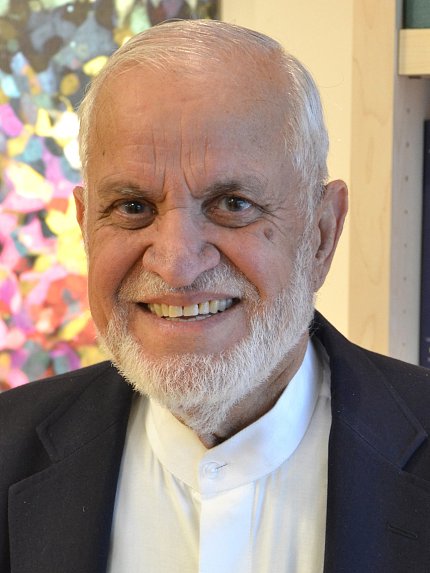Scientific Review Officer, Mentor Khan Bids Farewell

Dr. Mushtaq Khan lives by the creed “Live to Give.” It guided him through 38 years of federal service, including 27 at NIH supporting the review process with a focus on digestive disease research. It led him to mentor numerous NIH colleagues and extramural researchers. And it has guided him in the creation of a nonprofit organization that provides water pumps and other services in his native Pakistan and elsewhere.
Khan retired in January as scientific review officer (SRO) of the clinical, integrative and molecular gastroenterology study section. “He has guided us by example,” said Dr. Patricia Greenwel, an SRO whom he mentored when she first came to the center. “He has impacted the life of many people at NIH and he has been the face of NIH to the gastroenterology field.”
Khan grew up near Faisalabad. At age 13, he was selected for a highly competitive program toward a career as an air force officer. He changed directions, however, and studied veterinary medicine at the University of Panjab in Lahore. There, a professor of physiology influenced his eventual life choices.
“I remember him walking around the classroom, hands in his pockets, lecturing without notes about the thyroid gland,” Khan recalled. “I realized—this is what I want to do.”
Khan received a master’s in animal nutrition at Montana State University. Through a U.S.-Pakistani exchange program, he then earned his Ph.D. in the School of Veterinary Medicine at Washington State University, with a major in physiology and minor in nutrition.
After teaching for 6 years at the University of Maryland Medical School, Khan served as head of perinatal toxicology at the Food and Drug Administration. At both institutions, he conducted research in nutritional toxicology.
He came to the Division of Research Grants (now CSR) in 1988. He played a leading role in a reorganization to better review gastrointestinal research. From 1997 to 2013, he was chief of the digestive, kidney and urological systems integrated review group.
“Mushtaq’s ‘glass-half-full’ philosophy to life has a profound impact on those around him,” said Dr. Richard Hodin, a surgical leader at Massachusetts General Hospital and former study section chair. Khan was particularly known for his support of early career investigators. As Dr. Michael Martin, a former CSR division director, said, “There was never any concern when Mushtaq was involved. When he said he could get [something] done, he did.”
Khan, his wife and their four children have often visited Pakistan, but the country’s devastating 2006 earthquake led to a new direction. He and his wife volunteered in a field hospital to assist with relief efforts. He learned about a low-tech solution to the lack of clean water affecting many villages—a community hand-pump and filter. When he returned to the U.S., he set up his charity, which has provided 600 pumps to date. The charity also has contributed to post-disaster relief in Japan and Haiti.
“I am not retiring, I’m changing focus,” Khan stressed. “Live to give, that is the most important thing in my life right now.” He will spend more time on his charity when he leaves NIH, beginning with a trip to Pakistan in February.
